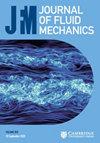旋转的电解质第 2 部分:二次循环及其稳定性二次循环及其稳定性
IF 3.9
2区 工程技术
Q1 MECHANICS
引用次数: 0
摘要
本研究的第一部分(McCloughan & Suslov, J. Fluid Mech., vol. 980, 2024, A59)对发生在电解质浅环形层中的稳定方位角不变电磁驱动流进行了渐近分析,预测了以前未曾发现的双蝶形流动状态的存在。在研究的第 2 部分,我们通过对控制方程进行数值时间积分来证实它的存在。我们观察到一种滞后现象,即对同一组控制参数得到的解的类型取决于初始条件的选择和控制参数的变化方式,这与第 1 部分的分析结果完全一致。随后,我们对新得到的稳定状态进行了线性稳定性分析,并推断出实验观测到的反环形自由表面涡旋出现的背景是两个反向旋转环形结构界面的离心(雷利型)不稳定性导致的。我们确定了这种不稳定结构的定量特征。研究表明,这种结构只能存在于深度不超过某个临界值的足够薄的层中。本文章由计算机程序翻译,如有差异,请以英文原文为准。
Swirling electrolyte. Part 2. Secondary circulation and its stability
The asymptotic analysis of steady azimuthally invariant electromagnetically driven flows occurring in a shallow annular layer of electrolyte undertaken in Part 1 of this study (McCloughan & Suslov, J. Fluid Mech. , vol. 980, 2024, A59) predicted the existence of a two-tori flow state that has not been detected previously. In Part 2 of the study we confirm its existence by numerical time integration of the governing equations. We observe a hysteresis, where the type of solution obtained for the same set of governing parameters depends on the choice of the initial conditions and the way the governing parameters change, which is fully consistent with the analytic results of Part 1. Subsequently, we perform a linear stability analysis of the newly obtained steady state and deduce that the experimentally observed anti-cyclonic free-surface vortices appear on its background as a result of a centrifugal (Rayleigh-type) instability of the interface separating two counter-rotating toroidal structures that form the newly found flow solution. The quantitative characteristics of such instability structures are determined. It is shown that such structures can only exist in sufficiently thin layers with the depth not exceeding a certain critical value.
求助全文
通过发布文献求助,成功后即可免费获取论文全文。
去求助
来源期刊
CiteScore
6.50
自引率
27.00%
发文量
945
审稿时长
5.1 months
期刊介绍:
Journal of Fluid Mechanics is the leading international journal in the field and is essential reading for all those concerned with developments in fluid mechanics. It publishes authoritative articles covering theoretical, computational and experimental investigations of all aspects of the mechanics of fluids. Each issue contains papers on both the fundamental aspects of fluid mechanics, and their applications to other fields such as aeronautics, astrophysics, biology, chemical and mechanical engineering, hydraulics, meteorology, oceanography, geology, acoustics and combustion.

 求助内容:
求助内容: 应助结果提醒方式:
应助结果提醒方式:


